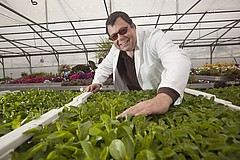EU approves stevia as sweetener:
Scientist of the University of Hohenheim sees enormous potential. [22.11.11]
Stevia-researcher Dr. Udo Kienle welcomes partial approval by EU / “First step for consumers” / “Great potential for the EU, the food industry and tobacco growers”
Many times sweeter than sugar, naturally grown and 100% calorie-free: Stevia to become legalised as sweetener as of December 3rd. However, this decision is not yet stevia’s big chance according to stevia researcher, Dr. Udo Kienle of the University of Hohenheim. Only relatively small amounts can be added to food. Farmers are still not allowed to cultivate the sweet plant. Nevertheless, the decision to partially approve the use of stevia is a step in the right direction for consumers and the potential for using the plant is enormous.As of December 3rd, food products which contain steviol glycosides, a sweetening agent, will be legally available for purchase in stores and supermarkets. This is according to an official bulletin posted by the European Union last Saturday. Steviol glycosides are extracted from the sweet-tasting stevia rebaudiana plant.
Limits on its use, however, are currently in place. Food manufacturers must make sure that the maximum daily allowance of 4 mg/kg of body weight cannot be consumed. The cultivation of stevia in Europe has also yet to be approved.
Stevia research from consumer acceptance to farming potential
Stevia has been grown in the greenhouses of the University of Hohenheim for research purposes for decades. Dr. Udo Kienle of the University of Hohenheim has been conducting research on the sweet-tasting plant, which originally comes from Paraguay, for over 30 years.
During this time, he has looked at the cultivation and processing techniques needed to make it a viable product in the European marketplace. He also conducted market research to examine consumers’ acceptance of the product and their expectations of it. By EU mandate, Dr. Kienle is also investigating whether or not stevia could perhaps provide an alternative source of income for tobacco growers. His book “Stevia rebaudiana – Der Zucker des 21. Jahrhunderts” (Stevia rebaudiana - the Sugar of the 21st Century) was published by Spurbuch in 2011.
High barriers to approval had to be overcome
Dr. Kienle observed with a keen eye how stevia managed to gain a foothold around the world, albeit sluggishly. In Japan, stevia was classified as a natural product meaning that it did not require government approval to be used in products. Brazil followed suit in the 1980’s where stevia was not subjected to any forms of health studies. The USA started to permit its use under special restrictions in 1994. In 2008, Switzerland became the first country in Europe to permit the sale of products containing steviol glycosides.
The fact that the EU has waited so long to allow the use of stevia is something Dr. Kienle finds to be positive nevertheless. “The EU acted correctly by making approval rather difficult. It is a health issue after all. That’s why it has taken so long to finally get the substance approved.”
Dr. Kienle also notes that food manufacturers have also been faced with the dilemma of enduring complicated and costly scientific studies. “At the same time, the product cannot be patented since it’s of natural origin. That scared off a lot of firms.” The first studies on stevia, which were carried out in the 1980’s and which indicated that the substance might lead to health problems for consumers, also did not help that much according to Dr. Kienle.
Conspiracy theories shattered
Dr. Kienle also contradicts popular conspiracy theories which claim that a powerful lobby has been responsible for the ban of stevia. “My impression is that the theories stem from people who are involved in illegal sales of stevia. The image of a big, bad sugar lobby is good for business.”
And in fact, stevia can be found in Germany in products which are officially declared as bath additives or cosmetics. “For a long time a company which was willing to launch such a product onto the market was missing. Now Cargill, the distributor of Coca-Cola jumped on board and started up the project. That could very well be the big breakthrough”, says Dr. Kienle.
Need for further research in the food industry
Nevertheless, products such as a 100% stevia-sweetened soft drink will not be on sale any time soon. “EU guidelines allow for a maximum sugar substitution of 30%.”
In addition, there is still quite a need for further research in the food industry before any market launch. “There is not enough uniformity in the production process of steviol glycosides. Each manufacturer does it differently and it comes out tasting slightly different each time. The problem is that it doesn’t taste the same to everyone and that it doesn’t harmonise with every product.”
Impact of consumer aceptance “In taste tests, 25% of those tested did not like any of the products which contained steviol glycosides. Another 25% liked all of the products. The remaining 50% were strongly divided on the various products. Opinions varied from ‘very good’ to ‘very poor’.”
For Dr. Kienle, his personal opinion of stevia is clear. In contrast to steviol glycosides, the leaves of the stevia rebaudiana plant are wonderfully sweet. “I’ve tasted them many times and I find them simply incredible! It’s a taste you will never forget.”
Recommended reading
Dr. Udo Kienle: “Stevia rebaudiana – Der Zucker des 21. Jahrhunderts” (Stevia rebaudiana - the Sugar of the 21st Century), Spurbuch publishers, 2011, hardcover with color inlays, 184 pages, ISBN 978-3-88778-356-3, price: €19.80
Text: Klebs / Transl.: O'Mealy
Contact for press:
Dr. Udo Kienle, Universität Hohenheim, Institut für Agrartechnik, Tel.: 0711/459-22845, E-Mail: u-kienle@uni-hohenheim.de


